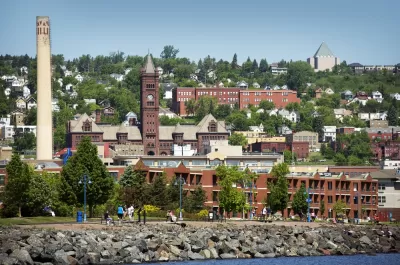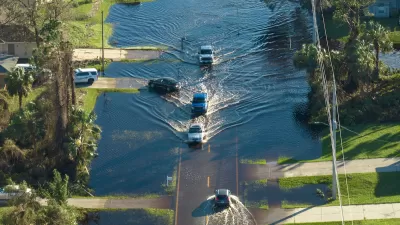While the data still shows many Americans moving toward climate risk, an increasing number have noted the obvious effects of climate change and decided to move toward fresh water and milder climates.

Duluth, Minnesota, with its abundance of fresh water and room to grow, has been identified as a potential climate migration hotspot—and many new arrivals are already crediting climate change for their move into the city at the edge of Lake Superior.
An article by Dan Kraker reviews some of the marketing and academic behind the idea of "Climate-proof Duluth," a phrase coined by climate adaptation expert Jesse Keenan. The idea and the location behind the phrase have already attracted media attention from The New York Times and CNN.
Kraker speaks with two recent climate migrants from California—who moved from Golden State's wine country to escape wildfires and floods. According to Keenan, they fall into one of two categories of climate migrants—those with the resources to move after evaluating where they are living for climate risks. The other group is made up by people who have been displaced by climate-related disasters and lack the resources to relocate or rebuild.
"There isn't much data to show how many people are actually moving because of climate change. Only anecdotal stories. Duluth hasn’t grown much in the past decade, only adding around 400 residents since the last census," explains Kraker.
"But in a survey of 2,000 U.S. residents last year, the online real estate company Redfin found that about half of Americans who planned to move factored extreme weather and natural disasters into their decisions to relocate."
Kraker quotes Daryl Fairweather, chief economist at Redfin, in mentioning a very large caveat to that data about the intentions of Americans to move away from climate risk—most Americans are still, in fact, moving toward climate risk, as documented in research also published by Redfin in August 2021.
Still, experts like Keenan says cities like Duluth should expect the trend of climate migrants to accelerate, especially while housing prices in expensive coastal regions provide additional reasons to relocate.
FULL STORY: Climate-proof Duluth? Why the city is attracting 'climate migrants'

Maui's Vacation Rental Debate Turns Ugly
Verbal attacks, misinformation campaigns and fistfights plague a high-stakes debate to convert thousands of vacation rentals into long-term housing.

Planetizen Federal Action Tracker
A weekly monitor of how Trump’s orders and actions are impacting planners and planning in America.

Chicago’s Ghost Rails
Just beneath the surface of the modern city lie the remnants of its expansive early 20th-century streetcar system.

Bend, Oregon Zoning Reforms Prioritize Small-Scale Housing
The city altered its zoning code to allow multi-family housing and eliminated parking mandates citywide.

Amtrak Cutting Jobs, Funding to High-Speed Rail
The agency plans to cut 10 percent of its workforce and has confirmed it will not fund new high-speed rail projects.

LA Denies Basic Services to Unhoused Residents
The city has repeatedly failed to respond to requests for trash pickup at encampment sites, and eliminated a program that provided mobile showers and toilets.
Urban Design for Planners 1: Software Tools
This six-course series explores essential urban design concepts using open source software and equips planners with the tools they need to participate fully in the urban design process.
Planning for Universal Design
Learn the tools for implementing Universal Design in planning regulations.
planning NEXT
Appalachian Highlands Housing Partners
Mpact (founded as Rail~Volution)
City of Camden Redevelopment Agency
City of Astoria
City of Portland
City of Laramie





























